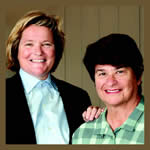
By Andrew Cohen
Penny Cooper ’64 and Cris Arguedas, who teamed up to form one of the nation’s top criminal defense firms, were recently inducted into the Trial Lawyer Hall of Fame by the California State Bar’s Litigation Section. The award, presented to them jointly at the Claremont Hotel in Berkeley, is given annually to exceptional trial lawyers whose careers exemplify the highest of values and professional attainment.
“The work we did together was enlivening, fantastic, and at times pioneering,” says Cooper. “We were the first women defense lawyers to try a major white-collar crime case, and engaged in a number of other memorable cases. Receiving this honor together made it that much more meaningful.”
Renowned for her cross-examination skills, Cooper managed to obtain acquittals and reduced sentences in several high-profile cases during her career. In 1990, she worked with Arguedas to win the ultimate dismissal—after the jury hung 11-1 for acquittal following a 10-month trial—of Michael Blatt in the “crossbow” murder case. Cooper also convinced the prosecution to dismiss charges in the “repressed memory” case of George Franklin in 1998, and in 2000 persuaded the prosecution to dismiss a case against Dr. William Liebman, a Marin County physician accused of diluting vaccines given to children.
“We were the perfect complement to each other,” Argeudas says. “Penny was a much more experienced lawyer when we joined forces, and I learned a great deal about strategy, trial tactics, and cross-examination. We weren’t afraid to disagree, which was crucial. Almost every trial decision can be viewed a number of different ways, and we’d often take different opinions, argue it out, and arrive at a good decision. We also weren’t afraid of anybody, be it a judge or prosecutor, and we gave it everything we had.”
Both lawyers believe that approach is imperative in criminal defense work. “When you’re a criminal defense lawyer you lose a lot,” Cooper says. “Your daily experience is with judges and prosecutors who have tremendous power and use it against you and your client. In criminal defense, you’re always the underdog.”
Cooper retired in 2001, but is still Of Counsel to Cooper Law Offices in Berkeley—run by her two nephews. She is also President of the Board of Trustees of the Prison Law Office, which works to improve prison conditions in California.
Like Cooper, Arguedas is a longtime supporter of Berkeley Law, and also teaches Criminal Trial Practice at the school. A partner at Arguedas, Cassman & Headley in Berkeley—formerly Cooper, Arguedas & Cassman—she was named one of the five most promising women lawyers in the country by Time magazine at age 29. Since then, Arguedas has been heralded by top publications such as the Wall Street Journal, National Law Journal, California Lawyer, and included in every edition of Best Lawyers in America since its inception in 1983.
Starting in 1982, Cooper and Arguedas quickly built a powerhouse practice that attracted clients as far away as New York and as high-profile as O.J. Simpson. In 1995, they were invited to join the Simpson defense team and asked to put Simpson through a grueling mock cross-examination to help determine whether he should testify in court—which he did not.
While both lawyers bemoan the current direction of criminal defense work—Cooper says the 4th Amendment “has essentially disappeared” and Arguedas laments the sharp decline in funding for public defenders—neither would choose a new profession. “To be a criminal defense lawyer,” says Arguedas, “is still the most noble, most exciting, most challenging work there is.”